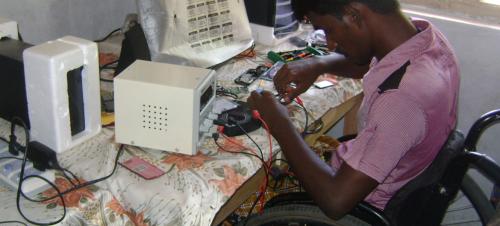Turn toxic e-waste into a source of ‘decent work’, UN labour agency urges
A “toxic flood of electric and electronic waste” that is growing by the day across the world, should be urgently converted into a source of decent work, that can also protect populations from its harmful effects, the United Nations labour agency said on Wednesday.

A disabled man operates a mobile phone repair business in Sri Lanka.
Governments, workers and employer organizations reached agreement at a meeting of the International Labour Organization (ILO) in Geneva, urging that “at all levels”, countries should look to increase and invest in better waste management infrastructure and systems to deal with “the rapidly growing flows of e-waste in ways that advance decent work”.
“Every stage of the reuse, recycling, refurbishing, resale” process, when it comes to technology “has to be looked at in much more systematic ways”, said Nikhil Seth, Chair of the ILO Global Dialogue Forum on Decent Work in the Management of Electrical and Electronic Waste.
Countries also recognized the crucial need to protect those working with toxic and hazardous e-waste, which negatively affects both them and the environment.
“Workers handling e-waste have no voice, no bargaining power”, said worker vice-chairperson, James Towers, pointing out that “they are breaking hazardous materials by their hands.”
Moreover, he added that “these workers are unaware of the many risks associated with handling e-waste”.
A ‘great business opportunity’
The world produces as much as 50 million tonnes of e-waste a year, and although it is valued at 55 billion euros, or more than 60 billion dollars, only 20 per cent of e-waste is formally recycled, according to ILO.
It is, however, becoming an increasingly important resource for in the informal work sector. Along the e-waste value chain, they recover, refurbish, repurpose and recycle electrical and electronic equipment, bringing innovative services and products to the market, aiding the whole “circular” recycling economy.
“There is [a] great business opportunity in the e-waste sector”, stressed employer vice-chairperson, Patrick Van den Bossche
“We need to step up our efforts in creating decent and sustainable jobs, fostering an enabling environment for sustainable enterprises, offering new products and new services, and adding value through enhancing the circular economy”, he affirmed.
Government vice-chairperson Aniefiok Etim Essah spoke about how e-waste is littering the landscape of his country, Nigeria, as well as other African nations, arguing that this can be turned into a positive: “Our youth possesses the creativity and potential for learning skills to manage e-waste, giving us the opportunity to increase youth employment,” he said.
ILO is a member of the UN E-Waste Coalition, formed to increase collaboration, build partnerships and more efficiently provide support to help States address the e-waste challenge.
Source:United Nations
- 265 reads
Human Rights
Ringing FOWPAL’s Peace Bell for the World:Nobel Peace Prize Laureates’ Visions and Actions

Protecting the World’s Cultural Diversity for a Sustainable Future

The Peace Bell Resonates at the 27th Eurasian Economic Summit

Declaration of World Day of the Power of Hope Endorsed by People in 158 Nations

Puppet Show I International Friendship Day 2020

